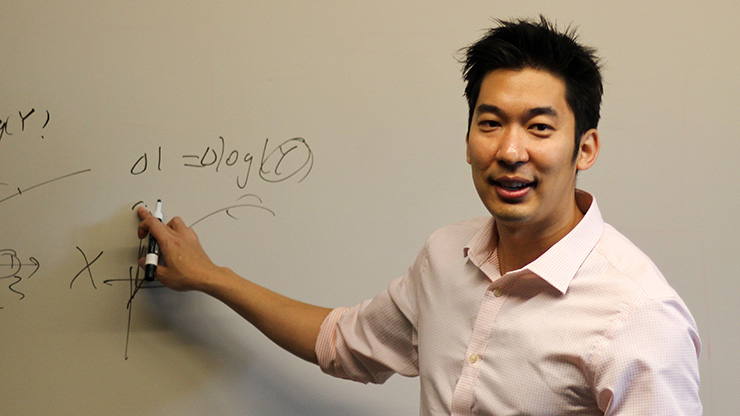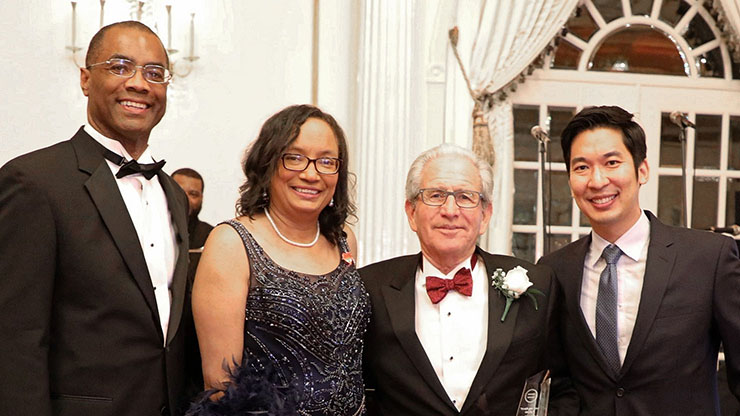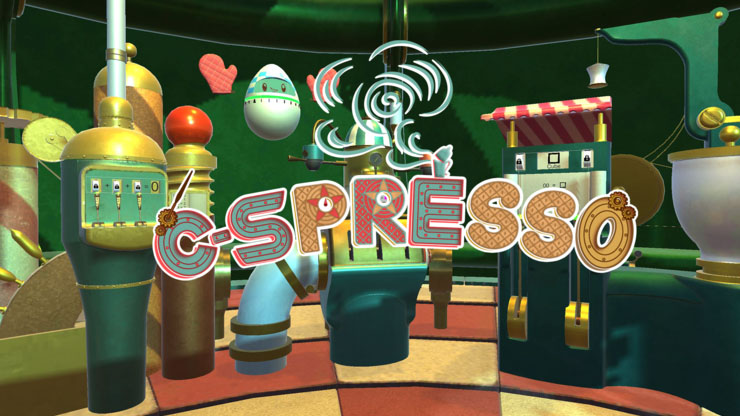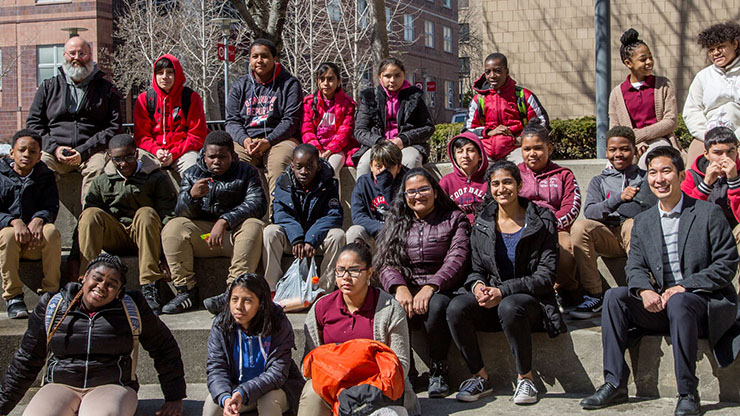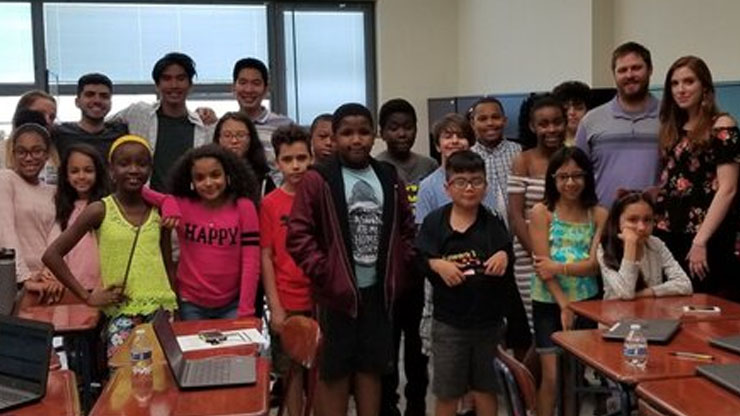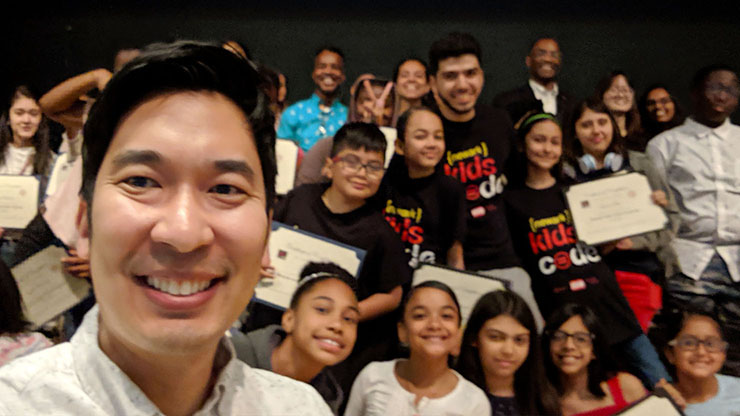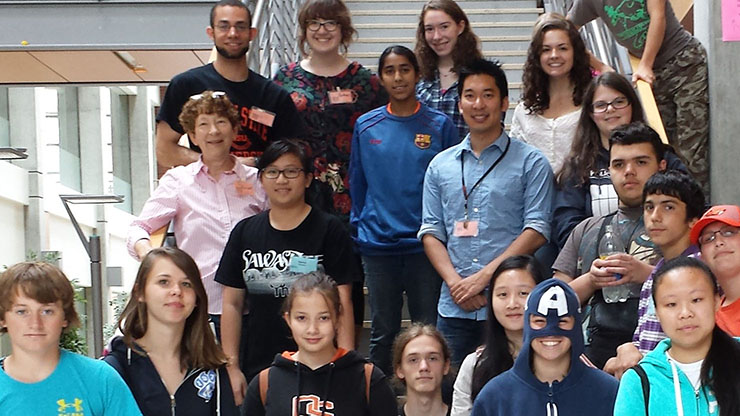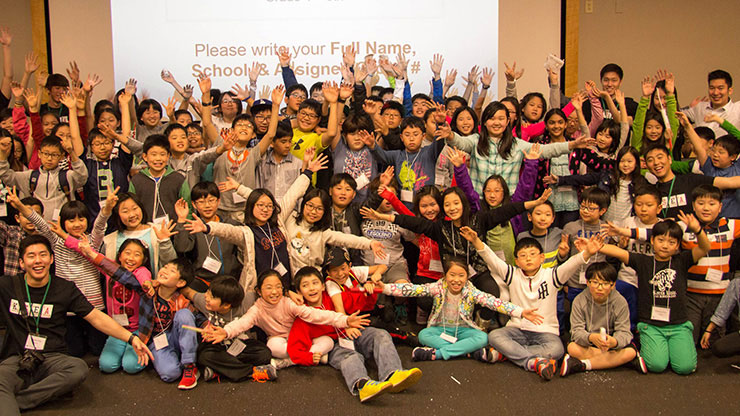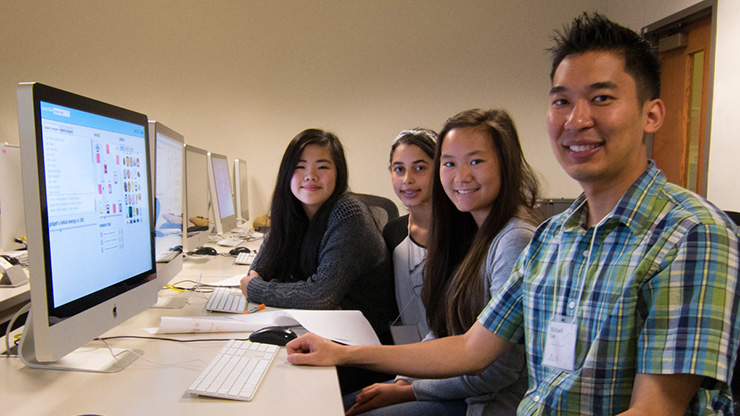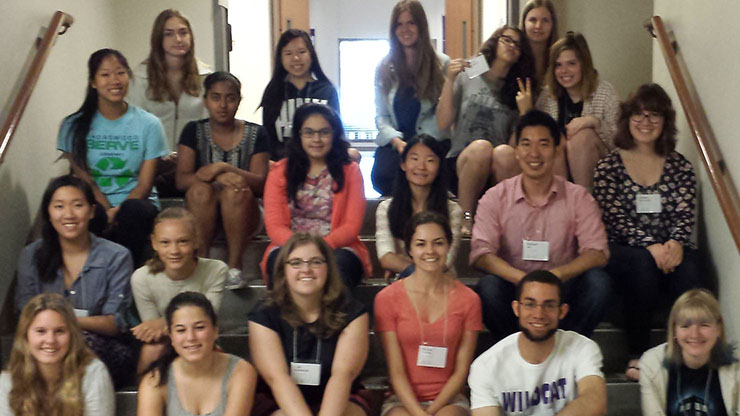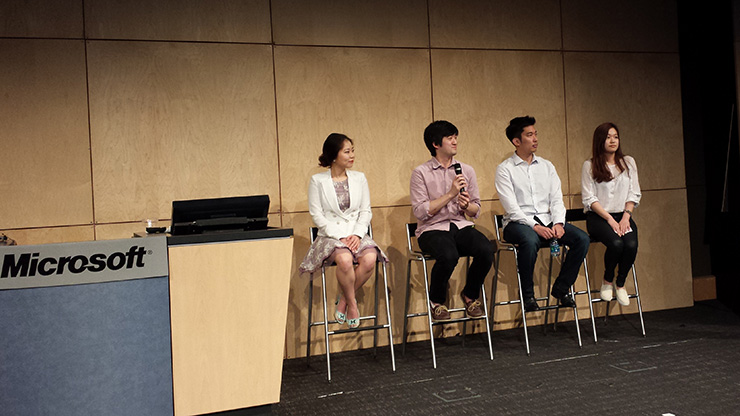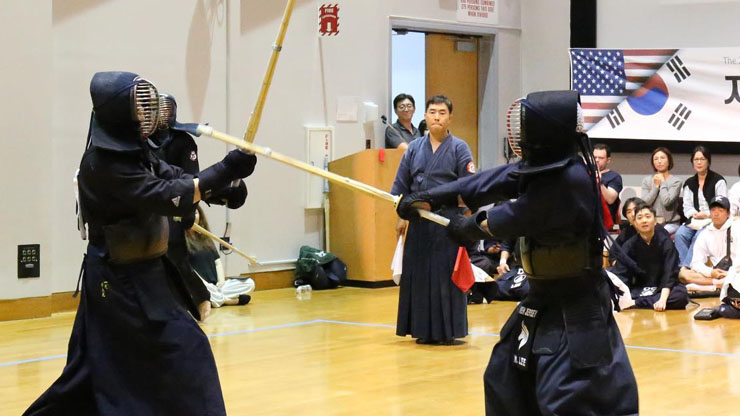curriculumvitae
About Me
Dr. Michael J. Lee (he/him) is the Dorman-Bloom Associate Professor of Informatics (and affiliated with the Albert Dorman Honors College) at the New Jersey Institute of Technology. He directs the Gidget (Gender Inclusive Design, Game, and Educational Technology) Lab, which designs, creates, and tests tech-focused educational tools for all.
Dr. Lee's major area of focus is in human-computer interaction (HCI) and computing education research (CER). More specifically, he is interested in how people can use technology to effectively and measurably teach novices basic programming concepts. He created Gidget, an online puzzle game designed to teach debugging and programming. People from all over the world have played the game online since its release (and you should try it out too!). He also works with Newark Public Schools (NPS) and the Urban League of Essex County (ULEC) to help run the Newark Kids Code program to teach youth coding.
You can also find him on the following pages: Google Scholar, ORCID, and NJIT.
Recruitment
I am recruiting undergraduate students who are interested in computing education research for ongoing and future projects (unfortunately, I do not currently have extra funding for additional PhD students). Please take a look at our lab's recent publications and contact me, Michael J. Lee, by email, indicating your research interests, projects that you have worked on (e.g., ePortfolio, app, website, Github repositories), and why you think you might be a good fit for our lab. I am specifically looking for those interested in topics of computing education or STEM education, preferably with some coding experience. Due to the high volume of emails I receive, I will not be able to respond to emails that do not include the information listed above.
Note: Teaching assistance (TA) and grader positions are handled at the department level (and not by individual professors), so I will not be reponding to inquiries requesting these jobs.
Unlike most of academia, premier conferences in Computing Education and Human-Computer Interaction (HCI) are selective venues for archival research. These conferences exceed many journals in their selectivity, visibility, and impact. Moreover, some of the conferences below are listed as workshops (e.g., ICER), but are in fact selective, archival 2-day research venues (ACM requires that conferences of fewer than 3 days are called workshops). The key venues for my research include ICER, JCSC, SIGCSE, and VL/HCC. Access my google scholar page [here].
Book Chapters
Lee, M.J. (2024).
Coarse-Grained Detection for Personalized Online Learning Interventions.
In Ferwerda, B., Tkalcic, M., Germanakos, P., Graus, M. (Eds.). A Human-centered Perspective of Intelligent Personalized Environments and Systems,
Chapter 8, 207-220.
: [ext] Lee, M.J. (2020).
Providing Near-Peer Mentorship to Increase Underrepresented Minority Youths' Participation in Computing.
In Keengwe, J.S., Tran, Y. (Eds.). Handbook of Research on Equity in Computer Science in P-16 Education,
Chapter 1, 1-13.
: [ext] Macbeth, J.C., Lee, M.J., Kim, J.S., and Zhang, T.B. (2020).
Children Who Code.
In Green, L., Holloway, D., Stevenson, K., Leaver, T., Haddon, L. (Eds.). Routledge Companion to Digital Media and Children,
Chapter 6, 67-74.
: [ext] Refereed Publications
Choi, Y., and Lee, M.J. (2025).
Are There More Or Fewer Challenges? Linking Affordances Perspectives to Conflict Experiences in Hybrid Virtual Teams.
Conflict Resolution Quarterly (CRQ),
to appear.
Nanon, K., Vinnikov, M., Schwartz, M., and Lee, M.J. (2024).
Enhancing Learning of Matrix Transformations through Immersive Virtual and Augmented Reality Interfaces.
Journal of Computing Sciences in Colleges (JCSC),
Volume 40, Issue 3.
Lee, M.J., Lang, A., and Ferwerda, B. (2024).
Comparing K-8 Computing Education Implementations between South Africa and Sweden.
Journal of Computing Sciences in Colleges (JCSC),
Volume 40, Issue 3.
Nanon, K., Vinnikov, M., and Lee, M.J. (2022).
A Case Study of Serious Games with Augmented Reality for Learning Facilitating in Chemistry.
International Conference of Education, Research, and Innovation (iCERi),
3017-3026.
Eisenberg, D., Pias, T.S., and Lee, M.J. (2022).
Increasing Engagement in Online Classrooms with Augmented Reality Filters.
Journal of Computing Sciences in Colleges (JCSC),
Volume 38, Issue 3,
28-39.
Lee, M.J., and Shen, R. (2021).
Autonomy-Supportive Game Benefits Both Inexperienced and Experienced Programmers.
Journal of Computing Sciences in Colleges (JCSC),
Volume 37, Issue 2,
89-97.
: [local] Nersesian, E., Vinnikov, M., and Lee, M.J. (2021).
Travel Kinematics in Virtual Reality Increases Learning Efficiency.
IEEE Visual Languages and Human-Centric Computing (VL/HCC),
1-5.
: [ieee] [local] Wohn, D.Y., and Lee, M.J. (2020).
The Effect of Tracking and Reflecting on Study Habits on Study Behavior and Grades.
IEEE International Symposium on Technology and Society (ISTAS),
433-441.
: [ieee] [local] Lee, M.J. (2020).
Auto-Generated Game Levels Increase Novice Programmers' Engagement.
Journal of Computing Sciences in Colleges (JCSC),
Volume 36, Issue 3,
68-77.
: [acm] [local] Shen, R., and Lee, M.J. (2020).
Learners' Perspectives on Learning Programming from Interactive Computer Tutors in a MOOC.
IEEE Visual Languages and Human-Centric Computing (VL/HCC),
1-5,
(acceptance rate: 30%).
: [ieee] [local] Nersesian, E., Vinnikov, M., Spryszynski. A., Ross-Nersesian, J., and Lee, M.J. (2020).
Middle School Students Learn Binary Counting Using Virtual Reality.
IEEE Integrated STEM Education Conference (ISEC),
1-8.
(H. Robert Schroeder Best Paper Award).
: [ieee] [local] Nersesian, E., Vinnikov, M., Ross-Nersesian, J., and Lee, M.J. (2020).
Interdisciplinary Collaboration Approaches on Undergraduate Virtual Reality Technology Projects.
IEEE Integrated STEM Education Conference (ISEC),
1-8.
: [ieee] [local] Nersesian, E., Spryszynski, A., Espiritu, T., and Lee, M.J. (2020).
Pre-college Computer Science Initiative for Augmented and Virtual Reality Development.
IEEE Integrated STEM Education Conference (ISEC),
1-7.
: [ieee] [local] Nersesian, E., Ross-Nersesian, J., Spryszynski, A., and Lee, M.J. (2020).
Virtual Collaboration Training for Freshman Undergraduate STEM Students.
IEEE Integrated STEM Education Conference (ISEC),
1-8.
: [ieee] [local] Xu, Y. and Lee, M.J. (2020).
Identifying Personas in Online Shopping Communities.
Multimodal Technologies and Interaction (MTI), Special Edition on Understanding UX through Implicit and Explicit Feedback,
Volume 4, Issue 2, Article 19.
: [mdpi] [local] Shen, R., Wohn, D.Y., and Lee, M.J. (2020).
Programming Learners' Perception of Interactive Computer Tutors and Human Teachers.
International Journal of Emerging Technologies in Learning (iJET),
Volume 15, Issue 9,
123-142.
: [pkp.org] [local] Xu, Y., Ferwerda, B., and Lee, M.J. (2020).
A Qualitative Study of User Participation and Challenges in a Social Shopping Context.
ACM Theory-Informed User Modeling for Tailoring and Personalizing Interfaces (HUMANIZE).
: [ceur] [local] Lee, M.J. (2020).
(Re)Engaging Novice Online Learners in an Educational Programming Game.
Journal of Computing Sciences in Colleges (JCSC),
Volume 35, Issue 8,
146-155.
: [acm] [local] Lee, M.J. and Chiou, J. (2020).
Animated Hints Help Novices Complete More Levels in an Educational Programming Game.
Journal of Computing Sciences in Colleges (JCSC),
Volume 35, Issue 8,
136-145.
: [acm] [local] Xu, Y. and Lee, M.J. (2020).
Understanding User Participation and Interaction in Online Shopping Communities from the Social and Relational Perspectives.
Hawaii International Conference on System Sciences (HICSS),
1-10.
(Best Paper Award Nominee).
: [scholarspace] [local] Lee, M.J. (2019).
Increasing Minority Youths' Participation in Computing through Near-Peer Mentorship.
Journal of Computing Sciences in Colleges (JCSC),
Volume 35, Issue 3,
47-56.
(Best Paper Award).
: [acm] [local] Lee, M.J. (2019).
Exploring Differences in Minority Students' Attitudes towards Computing after a One-Day Coding Workshop.
ACM Innovation and Technology in Computer Science Education (ITiCSE),
409-415,
(acceptance rate: 27%).
: [acm] [local] Shen, R., Wohn, D.Y., and Lee, M.J. (2019).
Comparison of Learning Programming between Interactive Computer Tutors and Human Teachers.
ACM Global Computing Education Conference (CompEd),
2-8,
(acceptance rate: 33%).
: [acm] [local] Lee, M.J., and Geller, J. (2019).
CodeSport: Increasing Participation in Programming Using Coding Tournaments as an Alternative to Hackathons.
ACM Global Computing Education Conference (CompEd),
9-15,
(acceptance rate: 33%).
: [acm] [local] Lee, M.J., Spryszynski, A., and Nersesian, E. (2019).
Personalizing VR Educational Tools for English Language Learners.
ACM Theory-Informed User Modeling for Tailoring and Personalizing Interfaces (HUMANIZE),
24-26.
: [ceur] [local] Xu, Y. and Lee, M.J. (2019).
Personalizing User Interactions in a Social Shopping Context and Open Challenges.
ACM Theory-Informed User Modeling for Tailoring and Personalizing Interfaces (HUMANIZE),
20-23.
: [ceur] [local] Ferwerda, B., and Lee, M.J. (2019).
Tamagotchi++: A Serious, Personalized Game to Encourage Healthy Behavior.
ACM Theory-Informed User Modeling for Tailoring and Personalizing Interfaces (HUMANIZE),
1-5.
: [ceur] [local] Nersesian, E., Spryszynski, A., and Lee, M.J. (2019).
Integration of Virtual Reality in Secondary STEM Education.
IEEE Integrated STEM Education Conference (ISEC),
83-90.
: [ieee] [local] Nersesian, E., Spryszynski, A., Thompson, U., and Lee, M.J. (2018).
Encompassing English Language Learners in Virtual Reality.
IEEE Artificial Intelligence and Virtual Reality (AIVR),
200-203.
: [ieee] [local] Xu, Y., and Lee, M.J. (2018).
Shopping as a Social Activity: Understanding People's Categorical Item Sharing Preferences on Social Networks.
ACM Theory-Informed User Modeling for Tailoring and Personalizing Interfaces (HUMANIZE).
: [ceur] [local] Yan, A., Lee, M.J., and Ko, A.J. (2017).
Predicting Abandonment in Online Coding Tutorials.
IEEE Visual Languages and Human-Centric Computing (VL/HCC),
191-199.
: [ieee] [local] Jernigan, W., Horvath, A., Lee, M.J., Burnett, M., Cuilty, T., Kuttal, S.K., Peters, A., Kwan, I., Bahmani, F., Ko, A.J., and Mendez C.J. (2017).
General Principles for a Generalized Idea Garden.
Journal of Visual Languages and Computing (JVLC),
Volume 39, Issue C,
51-65.
: [sciencedirect] [local] Lee, M.J., and Ferwerda, B. (2017).
Personalizing Online Educational Tools.
ACM Theory-Informed User Modeling for Tailoring and Personalizing Interfaces (HUMANIZE),
27-30,
(acceptance rate: 30%).
: [acm] [local] Lee, M.J., and Ko, A.J. (2015).
Comparing the Effectiveness of Online Learning Approaches on CS1 Learning Outcomes.
ACM International Computing Education Research Conference (ICER),
237-246,
(acceptance rate: 26%).
: [acm] [local] Jernigan, W., Horvath, A., Lee, M.J., Burnett, M., Cuilty, T., Kuttal, S.K., Peters, A., Kwan, I., Bahmani, F., and Ko, A.J. (2015).
A Principled Evaluation for a Principled Idea Garden.
IEEE Visual Languages and Human-Centric Computing (VL/HCC),
235-243,
(acceptance rate: 29%).
: [ieee] [local] Lee, M.J., Bahmani, F., Kwan, I., Laferte, J., Charters, P., Horvath, A., Luor, F., Cao, J., Law, C., Beswetherick, M., Long, S., Burnett, M., and Ko, A.J. (2014).
Principles of a Debugging-First Puzzle Game for Computing Education.
IEEE Visual Languages and Human-Centric Computing (VL/HCC),
57-64,
(acceptance rate: 30%).
(Most Influential Paper Award (10 years)).
: [ieee] [local] Lee, M.J. (2014).
A Demonstration of Gidget, A Debugging Game for Computing Education.
IEEE Symposium on Visual Languages and Human-Centric Computing (VL/HCC),
211-212.
: [ieee] [local] Lee, M.J. (2014).
Gidget: An Online Debugging Game for Learning and Engagement In Computing Education.
IEEE Symposium on Visual Languages and Human-Centric Computing (VL/HCC),
193-194.
: [ieee] [local] Charters, P., Lee, M.J., Ko, A.J., and Loksa, D. (2013).
Challenging Stereotypes and Changing Attitudes: The Effect of a Brief Programming Encounter on Adults' Attitudes toward Programming.
ACM Technical Symposium on Computer Science Education (SIGCSE),
653-658,
(acceptance rate: 38%).
: [acm] [local] Lee, M.J., Ko, A.J., and Kwan, I. (2013).
In-Game Assessments Increase Novice Programmers' Engagement and Level Completion Speed.
ACM International Computing Education Research Conference (ICER),
153-160,
(acceptance rate: 24%).
(John Henry People's Choice Award).
: [acm] [local] Lee, M.J. (2013).
How Can a Social Debugging Game Effectively Teach Computer Programming Concepts?.
International Computing Education Research Conference (ICER),
181-182.
: [acm] [local] Lee, M.J. (2012).
Social Debugging Game for Learning & Engagement.
IEEE Symposium on Visual Languages and Human-Centric Computing (VL/HCC),
227-228.
: [ieee] [local] Lee, M.J., and Ko, A.J. (2012).
Investigating the Role of Purposeful Goals on Novices' Engagement in a Programming Game.
IEEE Visual Languages and Human-Centric Computing (VL/HCC),
163-166,
(acceptance rate: 25%).
: [ieee] [local] Lee, M.J. and Ko, A.J. (2012).
Representations of User Feedback in an Agile, Collocated Software Team.
ACM/IEEE International Workshop on Cooperative and Human Aspects of Software Engineering (CHASE),
67-82.
: [ieee] [local] Ko, A.J., Lee, M.J., Ferrari, V., Ip, S., and Tran, C. (2011).
A Case Study of Post-Deployment User Feedback Triage.
ACM/IEEE International Workshop on Cooperative and Human Aspects of Software Engineering (CHASE),
1-8.
: [acm] [local] Lee, M.J. and Ko, A.J. (2011).
Personifying Programming Tool Feedback Improves Novice Programmers' Learning.
ACM International Computing Education Research Workshop (ICER),
109-116,
(acceptance rate: 30%).
: [acm] [local] Dresang, E.T., Koh, K.W., Campana, K., Johnston, M., Lee, M.J., Marino, J., and Patin, B. (2011).
Scratch on the Surface and Beyond: a Creative Programming Language for All Ages.
Proceedings of the 2011 iConference (iConference).
Ryokai, K., Lee, M.J., and Breitbart, J.M. (2009).
Children's Storytelling and Programming with Robotic Characters.
ACM Conference on Creativity & Cognition (C&C),
19-28,
(acceptance rate: 22%).
(Best Paper Award).
: [acm] [local] Juried Publications
Pammer-Schindler, V., Harpstead, E., Xie, B., DiSalvo, B., Kharrufa, A., Slovak, P., Wiliams, J.J., Ogan, A., Lee, M.J. (2020).
Learning and Education in HCI: A Reflection on the SIG at CHI 2019.
ACM Interactions (IX).
: [acm] Xie, B., Harpstead, E., DiSalvo, B., Slovak, P., Kharrufa, A., Lee, M.J., Pammer-Schindler, V., Ogan, A., Williams, J.J. (2019).
Learning, Education, and HCI.
ACM Conference on Human Factors in Computing Systems Extended Abstracts (CHI),
6-7.
: [acm] [local] Burnett, M., Churchill, E., Lee, M.J. (2015).
SIG: Gender-Inclusive Software: What We Know About Building It.
ACM Conference on Human Factors in Computing Systems Extended Abstracts (CHI),
857-860.
: [acm] [local] Lee, M.J., Ferwerda, B., Choi, J., Hahn, J., Moon, J.Y., and Kim, J. (2013).
GitHub Developers Use Rockstars to Overcome Overflow of News.
ACM Conference on Human Factors in Computing Systems (CHI),
133-138.
: [acm] [local] Gilbert, M., Choe, E.K., Lee, M.J., and Kientz, J.A. (2012).
Firefly: Designing a Game for Promoting Relaxation Before Sleep.
Proceedings of the Workshop on Interactive Healthcare Systems (WISH),
29.
Ryokai, K., Lee, M.J., and Breitbart, J.M. (2009).
Multimodal Programming Environment for Kids: A "Thought Bubble" Interface for the Pleo Robotic Character.
ACM Conference on Human Factors in Computing Systems (CHI),
4483-4488.
: [acm] [local] Non-Refereed Papers
Shen, R., Chiou, J., Lee, M.J. (2020).
Becoming Lifelong Learners: CS Learners' Autonomy.
Consortium for Computing Sciences in Colleges - Northeastern Region (CCSC-NE).
Lee, M.J. (2017).
What's Next for Computing Education.
KSEE Ingenium Magazine, Volume 24, Issue 4 (Ingenium),
20-23.
Lee, M.J. (2014).
Gidget: An Engaging Online Game for Learning Introductory Programming.
ACM Conference on Computer Supported Cooperative Work, Workshop on Designing Futures for Peer-to-Peer Learning (CSCW).
: [local] Lee, M.J. (2013).
Gidget: An Online Debugging Game for Novice Programmers.
Proceedings of the 2013 US-Korea Conference on Science, Technology and Entrepreneurship (UKC),
139.
Lee, M.J. (2012).
Increasing Novice Learners' Engagement with Programming in an Online Programming Environment.
Proceedings of the 2012 Young Generation Technical and Leadership Conference (YGTLC),
99.
Lee, M.J. (2011).
Effects of Personified Feedback in Novice Programmers' Learning.
Proceedings of the 2011 US-Korea Conference on Science, Technology and Entrepreneurship (UKC),
285.
(Best Poster Award).
Lee, M.J. (2011).
Representations of User Feedback: From Support to Software Change.
Proceedings of the 2011 US-Korea Conference on Science, Technology and Entrepreneurship (UKC),
284.
Technical Reports
Hong, S., Jung, Y., Ahn, Y., Lee, Y., Lee, D., Ahn, T., Choi, Y., Lee. M.J. (2018).
The Development of a Teacher Training Program for the Enhancement of Teacher Competence in an Intelligent Information Society: Focusing on Classroom Teaching Skills.
Korea Institute of Curriculum & Evaluation (KICE).
: [NIS] [local] I work with NJIT's Center for Pre-College Programs to offer college courses to high school students (for college credit) through the Options Program. Partnering schools/districts can offer various NJIT courses to their high school students at discounted tuition rates. The following courses are those for which I am the (co-)creator and NJIT faculty liaison.

